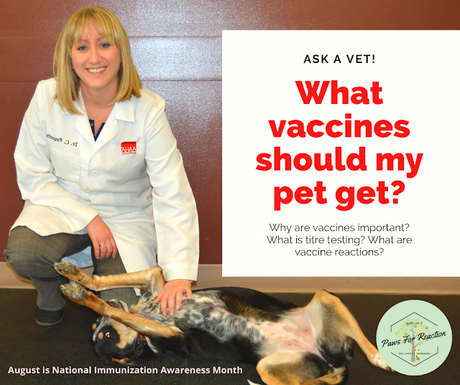
Dr. Carlie Paquette and her dog Bea
As a result of the global pandemic, there is one thing on everyone's mind: vaccines. COVID-19 has affected our lives in so many ways, including putting the importance of vaccines back in the news. Vaccines can be lifesaving- for you and your pet. There's a lot of misinformation online and on social media about vaccinations, including false side-effects and inefficacy of vaccines. The fact is, there's a lot more scientific evidence supporting the efficacy of vaccines then there is against it. Most arguments against vaccines are not fact-checked and purely antidotal.
Since August is National Immunization Awareness Month, I feel it's the best time to talk about vaccinating your pet. I interviewed my pet's veterinarian, Dr. Carlie Paquette, about the importance of vaccinating dogs and cats. Dr. Paquette is a veterinarian and co-owner of the award-winning Pembroke Animal Hospital (PAH) in Pembroke, Ontario. PAH is the 2016 winner of the American Animal Hospital Association (AAHA) Practice of the Year Award. They are the first Canadian veterinary hospital to win the prestigious award. Dr. Paquette has treated many of my pets. She most recently supported me during my final moments with Keira. She is a knowledgable, compassionate vet who I had the pleasure of working with for five years. I trust her more than anyone when it comes to caring for my fur-babies.
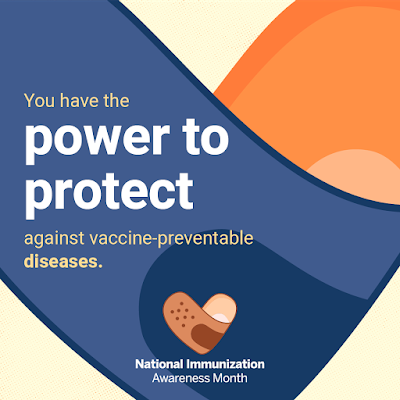
Why should I vaccinate my pet?
Like humans, dogs and cats are at risk of contracting many different infectious diseases, illnesses, and viruses. Pets are especially at risk because they don't have the same hygiene practices as humans. We don't have our noses to the ground, drink out of puddles, or put gross stuff in our mouth- but our pets do. Vaccinating your pets is one of the most important things you can do to help maintain the health of your fur-family.
"Vaccinations for your pet are important because they can provide protection against many infectious diseases, some of which can cause serious illness and spread to humans," said Dr. Paquette. "Some of the bacterial and viral infections we are able to vaccinate pets for are even fatal."
While most pet owners understand why vaccinating is important, many don't know much about what they are vaccinating against. Some diseases pets contract are zoonotic, meaning they can be passed on to humans. Let's find out the barks and meows of pet vaccines!

What vaccines does my dog need?
Canine vaccines in Ontario are broken down into two categories: core vaccines and lifestyle (non-core) vaccines. Core vaccines are vaccines that every dog should receive. Lifestyle vaccines are vaccines that your dog should only receive based on specific lifestyle.
Canine core vaccines
DA2PPV: This vaccine protects against several diseases. It protects against Canine Distemper, Adenovirus Type 1 (Hepatitis), Adenovirus Type 2 (Respiratory Disease), Parainfluenza, and the deadly and highly contagious Canine Parvovirus. Most are familiar with Parvovirus because it is so deadly. It's a hearty virus that stays viable outside of the body for a long time and spreads easily. It is most common in puppies, but can be contracted by dogs of any age that don't have the immunity that this vaccine can provide. I've seen puppies die from this disease. It's heartbreaking.
Rabies: It is the law in Ontario that you vaccinate your dog against rabies. Rabies is a fatal virus that affects the brain or spinal tissue. The virus is transmitted through saliva and can be passed from animals to humans. Wildlife is common carriers of rabies. Symptoms are painful and the mortality rate for rabies positive victims is high.
Leptospirosis: The disease is caused by the Leptospirosis bacteria. The bacteria is most commonly found in standing or slow-moving water. It is zoonotic, meaning your dog can pass this to people.
Canine lifestyle vaccines
Bordetella: Commonly referred to as the kennel cough vaccine, although I prefer to call it the canine cough vaccine because it is not exclusive to kennels, it can be transmitted dog to dog in any setting. Bordetella causes a hacking cough. Dogs that visit locations like kennels, dog parks, groomers, or settings that bring them nose to nose with a lot of dogs have a high-risk lifestyle and should receive the vaccine.
Lyme disease: Transmitted by infected ticks- primarily the black-legged tick (deer tick)- Lyme disease is a disease that affects both humans and dogs. Lyme disease can not be transmitted from dog to human. If your pet explores wooded areas, in long grass, or likes playing in leaf litter, that puts your pet at a higher risk. This vaccine should also be given to dogs who may not have this lifestyle, but live in areas like Kingston that suffer from a tick epidemic. Tick prevention and Lyme disease testing are just as important as vaccinating against Lyme disease, if not more important.
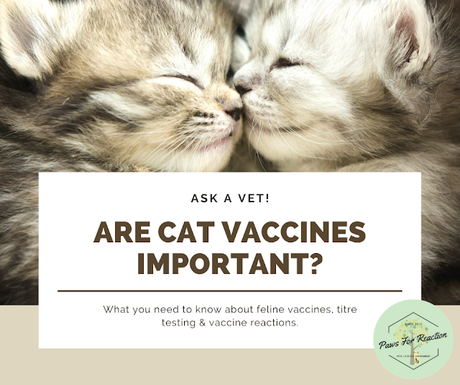
What vaccines does my cat need?
Feline vaccines in Ontario are broken down into two categories: core vaccines and lifestyle (non-core) vaccines. Core vaccines are vaccines that every cat should receive and make up the bulk of feline vaccines. Cats also have a lifestyle vaccine.
Feline core vaccines
FVRCP: This vaccine protects against several diseases. It protects against upper respiratory diseases Feline Rhinotracheitis and Feline Calicivirus, and the highly contagious Feline Panleukopenia (feline distemper).
Rabies: It is the law in Ontario that you vaccinate your cat against Rabies.
Feline lifestyle vaccines
Feline Leukemia: Feline Leukemia is one of the most common and important infectious diseases of cats worldwide. It's highly contagious cat to cat and is transmitted through saliva, nasal secretions, urine, feces, and milk of infected cats. Cats who spend a lot of time outdoors, especially if they are wandering and potentially interacting with feral cats have a high-risk lifestyle and should receive this vaccine.
What is an appropriate vaccine schedule for dogs and cats?
Following an appropriate vaccine schedule for your dog and cat is important, especially in your pet's first year. Dr. Paquette provides vaccines for lots of puppies and kittens at PAH and works with their owners to ensure they are properly immunized.
"Vaccine schedules may vary for your pet depending on when they last received a vaccine, the area you live and which diseases are more prevalent there, and your pet's age," Dr. Paquette said. "Puppies and kittens need their puppy and kitten vaccines at 8, 12, and 16 weeks. These are then 'boostered' or repeated 1 year later. After those vaccinations are completed most pets will receive viral vaccines every 3 years, such as rabies, and bacterial vaccines every year, such as leptospirosis."
The three-year rotation of viral vaccines is a way to prevent over-vaccination, something that pet owners are increasingly concerned with. Often the DA2PPV and Rabies vaccine can be rotated every three years for dogs.

What are vaccine titres and how do titres work?
You may have heard about something called titre testing. Titres are blood work that can be provided by your veterinarian. Once your pet is fully vaccinated, you have the option to do titre testing the following year to measure your pet's immunity.
"Titres can be done or requested to measure the level of protection in your pet's body for certain viruses," said Dr. Paquette. "Titres may be requested if you have to travel with your pet or if you decide to determine if your pet still has immunity to a virus, to see if a booster vaccine is required."
While titres are a great way to measure your pet's immunity, it does not replace vaccines. The downside of titres is that they are expensive compared to vaccinating because the bloodwork is sent to a lab to be analyzed. Another downside to titres is that the results may come back showing low immunity and the pet will require vaccinations anyway. Some viruses and diseases do not have titre testing available. Many countries like Australia require Rabies titre testing before importing your pet there.
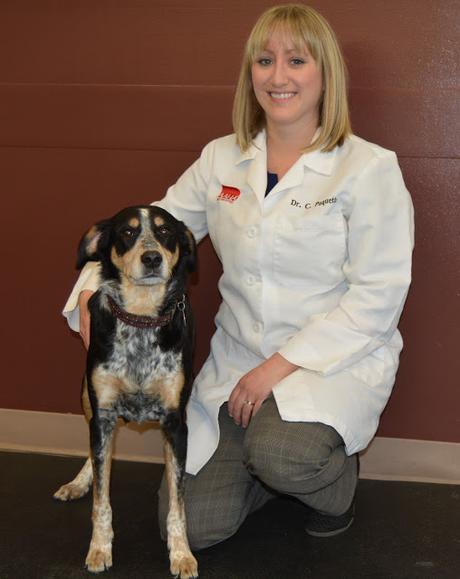
Common Side Effects of Vaccinations: What’s Normal and What Isn’t?
Another hot button topic on pet owner's minds is vaccine reactions. Extreme vaccine reactions are rare. If you have questions about vaccine reactions you should ask your veterinarian. So I asked mine!
"Most pets do not experience any side effects at all with vaccines, however, you may notice that they seem a little drowsy afterward. A slight fever can occur as well," Dr. Paquette explained. "Uncommon side effects include facial swelling, continuous vomiting, diarrhea, or swollen areas where the vaccines were given. These are uncommon reactions and should be reported to your veterinarian promptly. If your veterinarian is concerned about potential future vaccine reactions they may decide to pre-medicate your pet with Benadryl before future vaccines."
If you think your dog or cat has had a reaction to a vaccine, you should report this reaction to your veterinarian within 24-48 hours. Your vet will have the best advice and ability to provide treatment if necessary.
We've been trusting vaccines throughout history to keep us safe- and they've been doing a great job. When it comes down to it, the best person to speak to about your concerns with vaccinating is your veterinarian. Don't take what you read online or on social media at face value- not even this post! Do your research, but do it with a trusted veterinarian. Google can't replace the education and years of experience that your veterinarian has, and they want nothing more than to ensure that your pet lives a long life at your side, getting lots of cuddles and care.
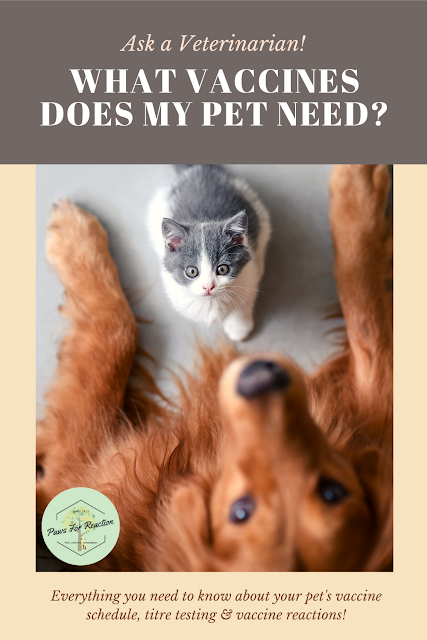
Like Paws for Reaction on Facebook
Follow @PawsForReaction on Twitter
Follow my blog and subscribe in the sidebar >>
